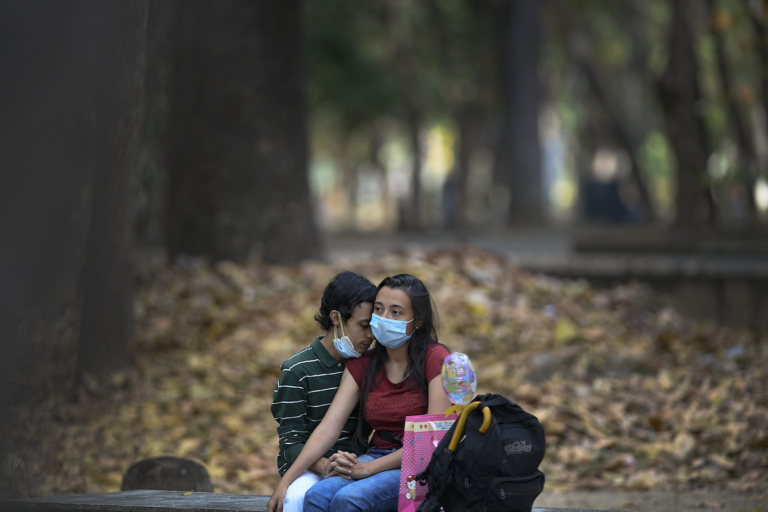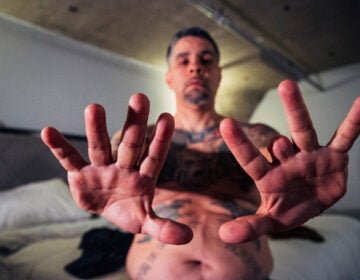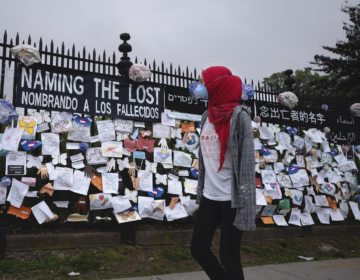How the COVID-19 pandemic changed relationships, and how to move forward
The pandemic and its fallout forged new bones of contention between friends and families. Psychologist Dan Gottlieb offers advice on how to begin repairing those relationships
Listen 7:51
A couple wearing masks curb the spread of the new coronavirus sit together at a public park in on Sunday, Feb. 14, 2021. (AP Photo/Matias Delacroix)
This story is from The Pulse, a weekly health and science podcast.
Find it on Apple Podcasts, Spotify, or wherever you get your podcasts.
For the first several months of the COVID-19 pandemic, Angie and a couple she’d befriended in Los Angeles made a hard decision. The friends agreed to a freeze in hanging out.
“We were almost like family,” said Angie, who asked us to only use her nickname to protect her privacy.
She’d first met the two, a husband and wife, while taking an adult French class—and the three of them had done everything together for over a decade afterwards.
“I came over to their home a lot,” Angie said. “I’d go hiking with them, eating with them, to events throughout the city. Whenever they had crises, they’d talk to me about it.” They even took Angie with them on vacations and work trips.
But when the coronavirus came ashore and began infecting Americans in March 2020, the friends didn’t see each other in person for months. When they finally did, they wore masks and stayed outdoors. Even when vaccines became available in 2021, Angie and her friends blanched at the prospect of hosting parties or dinners in their homes.
Soon, though, for reasons Angie can’t fully explain, things changed.
“They started going to events, and going indoors, with no masks,” she said. “It was a complete 180.”
Eventually, Angie said she felt her friends pressing her to step out, too.
“They said, ‘We just want to see you,’” she recounted.
But Angie’s partner at the time had lost his father, an ER doctor, to complications from COVID-19. A few months later, the boyfriend contracted post-COVID syndrome, known commonly as long COVID. He went from an active, engaging life—engineering by day, martial arts by night—to outsourcing his laundry and struggling to walk from his couch to his dining room. And Angie’s part-time gig as a contact tracer flooded her with stories about coronavirus’s consequences. So, she stayed vigilant—and, eventually, was left far more vigilant than many of the people around her.
Angie pulled the wife aside and explained where she was coming from, in the hopes that her concerns would be understood and respected. But when the curtain fell on that conversation, they both felt worse than ever.
“Her response was, ‘I’ve been doing all these things, and I never got COVID,’” Angie said.“Everything was being minimized, and I got really flustered.”
Her friend had become frustrated, too and mentioned that the couple had once kept a birthday party outside, in the rain, so that Angie could feel safe. To the friend, that felt like proof that she was taking the pandemic seriously.
Angie saw it differently.
“It felt like she was trying to manipulate me,” Angie said.
Angie and her friends were on a road that millions of people had taken before them: In August of 2021, a survey found that about 1 in 6 adults had severed at least three friendships amid differences of opinion on vaccines and precautions, according to OnePoll.
For people like Angie, the pandemic and its fallout forged new bones of contention between friends and families. For Carey Cadieux, a nursing PhD who’s taught RNs in Maine and New York, COVID-19 only widened a rift that was already there.
Before 2020, Cadieux said her marriage of 24 years often piled on responsibilities and rarely brought her help.
“I was the primary breadwinner,” she said. “I was the primary caregiver for the children. I organized everything.”
When Cadieux came down with COVID-19 in February 2020, she didn’t return to full strength for over a month. During her illness, she didn’t just want the duties and dynamics in her house to change —she felt they needed to, for her children’s sake as much as her own.
But they did not.
Subscribe to The Pulse
Cadieux’s husband, she said, had his own struggles that kept him from caring for her. He wasn’t in medicine, so she wasn’t expecting that, but she didn’t expect him to neglect the kind of care that family members often offer to the ailing. “Reaching out to see how they’re doing,” Cadieux explained. “Checking in throughout the day. Seeing what it is that they need.”
As she recovered, Cadieux says she dove into relational-therapy books and tried to imagine her marriage in the after-years. Instead, she found herself at a divorce lawyer’s desk, asking what it would take to close this chapter once and for all.
Cadieux ’s case isn’t unheard-of, either: Divorce rates had been in a dip since 2008, and they hit their lowest ebb—14 per 1,000 marriages — in 2020. Then, in 2021, as the lockdowns gave way to vaccines and major reopenings, that decline ended: Divorces ticked back up to 14.56 per 1,000 marriages.
Psychologist Dan Gottlieb explained that the pandemic’s toll on friends, couples, and families was normal. The difference between the relationships that survived the rows and the links that snapped for good, he said, was how valuable they were to the people involved.
“What we have to do is think about: ‘Is that relationship important to you?’” Gottlieb said. “Are you willing to do the work to try to repair it? If you’re angry at that person, are you willing, able to forgive?”
Cadieux still spends most of her time in Maine, where she and her husband raised their family. She still sees her former husband around town. But she says she isn’t confident they’ll ever speak again.
Meanwhile, Angie’s bond with her best friends is strong enough that they’ve kept in touch.
“They’re the kinds of people I would call if I was in an emergency,” Angie said.
Still, she’s worried that the pandemic has changed their relationship for good.
“I was very, very hurt, and very, very angry,” Angie remembers. “Somehow, we’ve talked it through. But it still doesn’t feel the same as before.”
WHYY is your source for fact-based, in-depth journalism and information. As a nonprofit organization, we rely on financial support from readers like you. Please give today.






